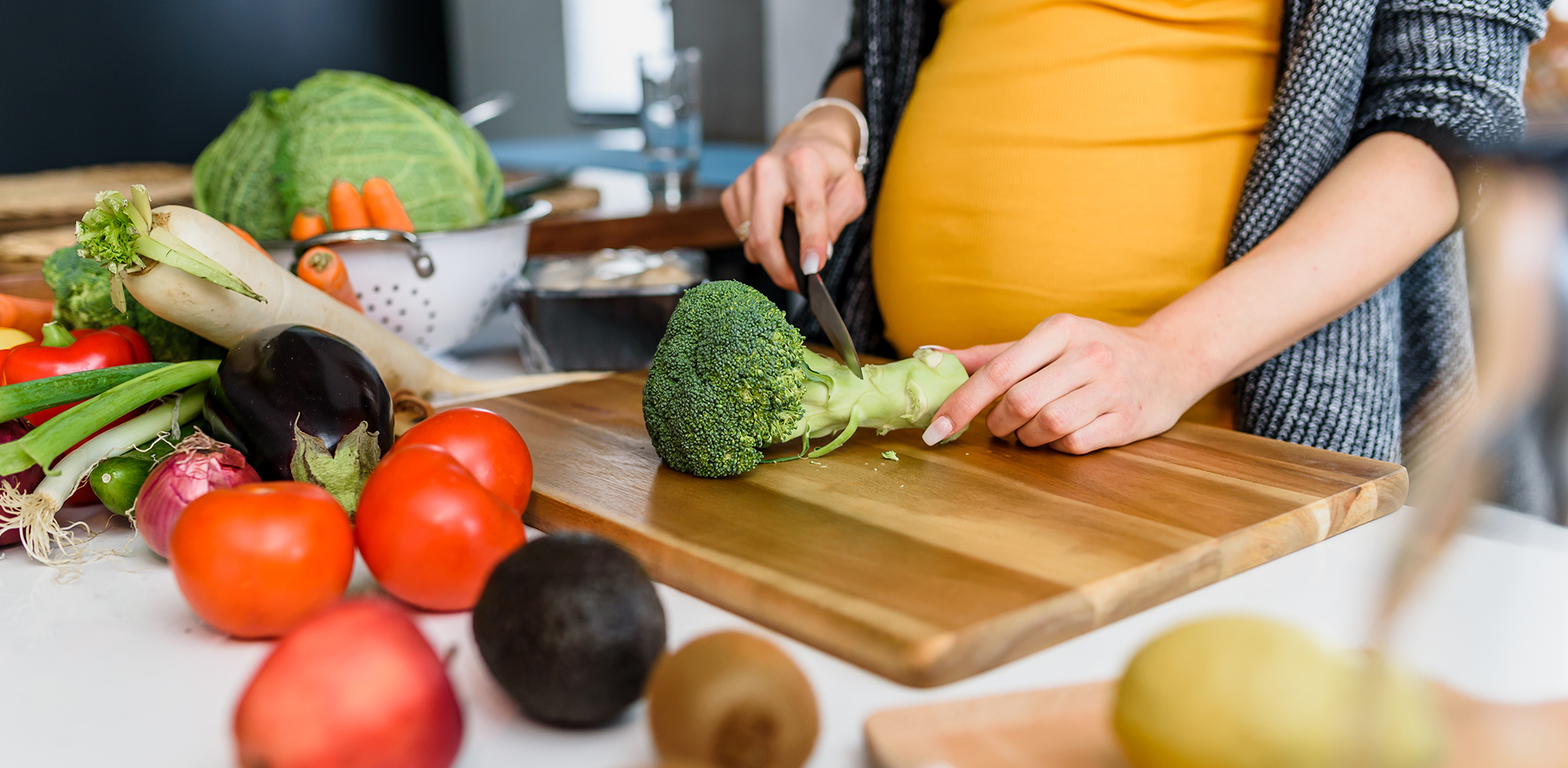Pregnancy is a special time for every woman. Nutrition during this period is a key element ensuring health for the developing fetus. The proper development of the child's tissues, organs and systems ensures an adequate supply of all necessary nutrients.
Basics of proper nutrition
Unreasonable nutrition during pregnancy or during feeding can contribute to hormonal disorders, miscarriages or serious developmental disorders in a child. You should take care of a healthy, rich and nutritious, balanced diet. During pregnancy, a woman's body needs more energy and nutrients. During this period, the demand for vitamins and minerals increases significantly, even by 50-100%. Daily calorie intake should be increased by 360 kcal in the second trimester and 475 kcal in the third trimester.
The greatest role in pregnancy, child development, and fertility itself is played by such food ingredients as:
• protein,
• unsaturated fatty acids,
• folic acid,
• vitamin C,
• vitamin A,
• vitamin D,
• magnesium,
• zinc,
• iron,
• selenium.

Protein
The above macronutrient is the main building compound. Insufficient protein during pregnancy may cause intrauterine growth retardation. This component is necessary for the synthesis of antibodies (immunoglobulin), cellular structures, as well as hormones and enzymes. During pregnancy, it is recommended to increase protein intake by approx. 12 g per day. The key aspect is to pay attention to its quality, not just quantity. You should choose wholesome sources containing a set of exogenous amino acids - meat, fish, eggs or good-quality dairy products. It is also worth enriching your diet with plant-derived protein, for example from legumes.
Fats
There should not be any suggestion of the common theory that during pregnancy you should limit the consumption of fats, because they are caloric and cause weight gain. Too strong restriction of the amount of energy supplied can have serious consequences. When planning a proper diet for a pregnant and lactating woman, one should pay attention to the proper selection of fats in favor of unsaturated fatty acids. First of all, take care of the supply of omega-3, which have a positive effect on reproduction, because they are precursors for building prostaglandins. These are hormones that regulate physiological processes in the body. In addition, omega-3 fatty acids are a key component of all cell membranes, and studies have shown a beneficial effect of their consumption on fertility. Unsaturated fats are an essential element for the development of a child's nervous system.
We will find them in products such as:
• nuts,
• an avocado,
• seafood,
• fish,
• sesame, sunflower seeds,
• vegetable oils (linseed, olive oil, rapeseed),
• eggs. In the diet of pregnant and lactating women, avoid fats with an unfavorable trans configuration.
Their sources are margarines, salty snacks, sweets.
Carbohydrates
This is the main source of energy for the developing fetus.
Good carbohydrate sources are:
• groats (buckwheat, millet, bulgur),
• rice (brown, basmati, wild, etc.),
• cereals,
• fruits,
• vegetables.
This macro-component should complement the energy expenditure for a pregnant woman.
Vitamins and minerals

Folic acid
It is a B group vitamin. Deficiency of folic acid results in anemia, abnormal cell division or fetal death, as well as premature detachment of the placenta. Supplementation before pregnancy and in the first trimester of pregnancy reduces by about 50-70% the risk of fetal neural tube defects, while also reducing the incidence of miscarriages. Nerve tube defects arise very early, as early as at the turn of the 3rd and 4th week of pregnancy. That is why it is so important for every woman to get the right amount of folic acid before she gets pregnant. It should be noted that folic acid is a synthetic form of folate, which needs a methyl group to transform into the correct form, so if you use a supplement, it's worth using in the form of metapholine. Dosage recommendations: - contraceptive period, early pregnancy up to the second trimester - 0.4 mg / day - megaloblastic anemia, hipehomocysteinemia - 5mg under control of serum folate concentration. Folic acid can also be provided with the diet. However, the absorption of folate from food varies greatly.
We mainly find it in green vegetables such as:
• broccoli,
• ale,
• spinach,
• lettuce,
• cabbage,
• fruits (e.g. oranges, kiwi),
• nuts.
Vitamin A
It plays a significant role in shaping the mucosa of the reproductive organs and placental development, as well as implantation of the embryo. Adequate supply protects against premature rupture of the membranes, eclampsia and intrauterine fetal impairment. However, you should know that an excess of this vitamin is toxic to the fetus. 750 mcg of retinol is recommended during pregnancy.
Vitamin D
Deficiencies in pregnancy can lead to, among others gestational diabetes, increased risk of eclampsia or acute lower respiratory tract infections in newborns. The daily dose recommended for pregnant and lactating women with a vitamin D3 deficiency in the diet is 2000 IU. However, it is best to adjust the supplements individually based on the result of the serum D3 test - 25 (OH) D3 test.
Vitamin C
It participates in the production of sex hormones, i.e. it plays an important role in the functioning of the endocrine system. Its positive effect on the structure and weight of the placenta, as well as the weight of the newborn are noted. Vitamin C is an antioxidant that protects the body against oxidative stress, and it is an important risk factor for infertility. Free radicals are reactive oxygen molecules that damage cells and body tissues in excess. Oxidative stress can cause fetal damage at an early stage of development by disrupting gene expression, thereby preventing its further development. Too much free radicals also prevent gametes, cell division, as well as fertilization and embryo implantation.
A rich source of vitamin C is:
• cranberry,
• parsley,
• citrus fruits,
• black currant,
• pepper,
• tomatoes,
• strawberries.
Omega-3 fatty acids
Adequate levels of omega-3 fatty acids (EPA and DHA) promote the development of the nervous system of the fetus, improve its nutrition, mental development, and reduce inflammation. Pregnant and lactating women should receive supplementation min. 200 mg DHA daily, but with low fish intake, higher supplementation, e.g. 400-600 mg DHA daily, should be considered.
How do you get 1 g of omega-3?
• 500 g codfish,
• 115 g mackerel,
• 50 g salmon,
• 25 g herring,
• 5 ml of fish oil.
Iron
It is primarily responsible for the transport of oxygen to tissues. Inadequate iron supply implies insufficient blood supply to the placenta and fetal hypoxia. Studies have shown that proper iron intake reduces the risk of infertility associated with ovulation disorders. 27 mg is recommended during pregnancy.
The source of iron in the diet is:
• spinach and other dark green vegetables,
• cereal,
• figs,
• legumes,
• nettle.
Magnesium
Proper magnesium intake plays an important role in maintaining fertility, because affects the secretion of responsible for ovulation follicle-stimulating hormone (FSH), luteinizing hormone (LH) and progesterone, which role is, among others support of pregnancy. Correct magnesium intake during pregnancy also reduces the risk of fetal growth retardation, premature delivery and low birth weight as well as pre-eclampsia and eclampsia dangerous for the child and woman. It is recommended to consume 360-400 mg of magnesium.
A rich source of magnesium are:
• cereal,
• legumes,
• nuts,
• cocoa,
• chicken eggs.
Zinc
It determines the formation of eggs, so it plays an important role in the course of ovulation. It is the building block of sex hormone receptors and also regulates DNA replication. Its too low intake causes ovulation disorders, embryo implantation problems and infections during pregnancy. It has a significant impact on the proper functioning of the immune system and, during pregnancy, on the development of this system in the fetus. Zinc determines the proper course of embryogenesis, cell division and gene expression, as well as lactation - so it is an essential component at every stage of planning the offspring, as well as after the birth of the child. It is recommended to consume 11-12mg / day.
Zinc can be found in products such as:
• cereal,
• nuts,
• eggs,
• legume seeds.
Selenium
Studies have shown a link between low selenium status in pregnancy and pre-eclampsia, pregnancy-induced hypertension, and premature delivery. Recommended dietary allowance (RDA) during pregnancy - 60mcg / day.
Iodine
Adequate supply prevents miscarriages, deliveries of dead fetuses, as well as disorders of the child's psychomotor development. In areas where iodine deficiency occurs, the use of supplementation reduced the incidence of birth defects and developmental disorders. It is recommended to consume 220 mcg / day. We cannot get such amounts of iodine solely on a diet rich in iodine-rich products - iodized salt, fish, eggs, algae, seafood, spinach, broccoli - additional supplementation is often recommended, agreed with your doctor.
Supplementation during pregnancy
Ingredients with clearly proven positive effect on pregnancy:
• folic acid,
• omega-3 PUFA,
• iron,
• iodine,
• vitamin D3,
Supplementation with folic acid, iodine, and vitamin D3 during pregnancy is indisputable in view of the confirmed high risk of deficiency in the population. Other ingredients: iron, DHA, magnesium and others depending on the level of existing deficiency or its specific risk. The contraceptive period and the first trimester require completely different supplementation than the second, third trimester and lactation period. Supplements should be consulted with the attending physician.
Diet during pregnancy

Basic recommendation:
• Spice up your meals. There is no product that contains all the necessary nutrients. The greater the variety of meals, the better.
• Replace white bread with whole-wheat bread. Whole meal rye bread has about 3-5 times more minerals than white bread. In addition, it is richer in vitamins and dietary fiber.
• Increase the amount of iron in your diet. A pregnant woman should consume meat, poultry or cold cuts twice a day. In order to improve the absorption of iron, you should consume vegetables and fruits rich in vitamin C with each meal. Choose lean types of meats and cold cuts. You should not forget about fish - they are a great source of valuable protein.
• Add vegetable oils to the salads - at least 1 tablespoon per day. They contain essential fatty acids necessary for the proper course of pregnancy.
• Increase your consumption of milk and dairy products. They are important for women and children because of the calcium it contains.
• Consume vegetables and fruits. They are the best source of vitamins and minerals.
• Eliminate alcohol and limit drinking large amounts of strong coffee. It was found that alcohol consumption during pregnancy increases the risk of low birth weight and miscarriage. This risk also increases due to high coffee consumption.
It is not recommended to consume during pregnancy:
• processed food,
• containing excessive amounts of salt and hot spices,
• food referred to as "Fast food" (hamburgers, hot dogs),
• products containing preservatives, artificial colors and flavors,
• raw, uncooked or undercooked meat,
• unpasteurized soft and blue cheese,
• raw fish and seafood,
• raw eggs and unpasteurized milk,
• excessive amounts of simple sugars,
• heavy, fatty foods,
• fish from an unknown source of catch,
• ready meals and delicatessen products,
• strong coffee and tea in excess,
• alcohol.
During pregnancy, an important element of rational nutrition is the abandonment of heavy-digestible products and dishes that could potentially cause food poisoning and contain ingredients that are harmful to health. Keeping the balance of vitamins and microelements in pregnant and lactating women can be achieved with a well-balanced diet rich in products with high nutritional density and individually selected vitamin and mineral supplementation.
The diet of a pregnant and lactating woman is of great importance because it allows:
• Ensuring the correct course of pregnancy,
• Optimal fetal development and growth,
• Maintaining baby's health after delivery,
• Maintaining the child's health in the first years of life,
• Reducing the risk of endocrine and metabolic diseases in adulthood.

Summary
Malnutrition, as well as eating excessive amounts of food during pregnancy, can have a negative impact on its course, growth and development of the fetus. The care of a dietitian choosing the right diet during pregnancy planning is one of the important ways to increase fertility, as well as the proper course of pregnancy, feeding and development of the child. It should be remembered that this is not the best time to use a slimming diet, but you should focus on providing the body with the supply of all necessary nutrients.





